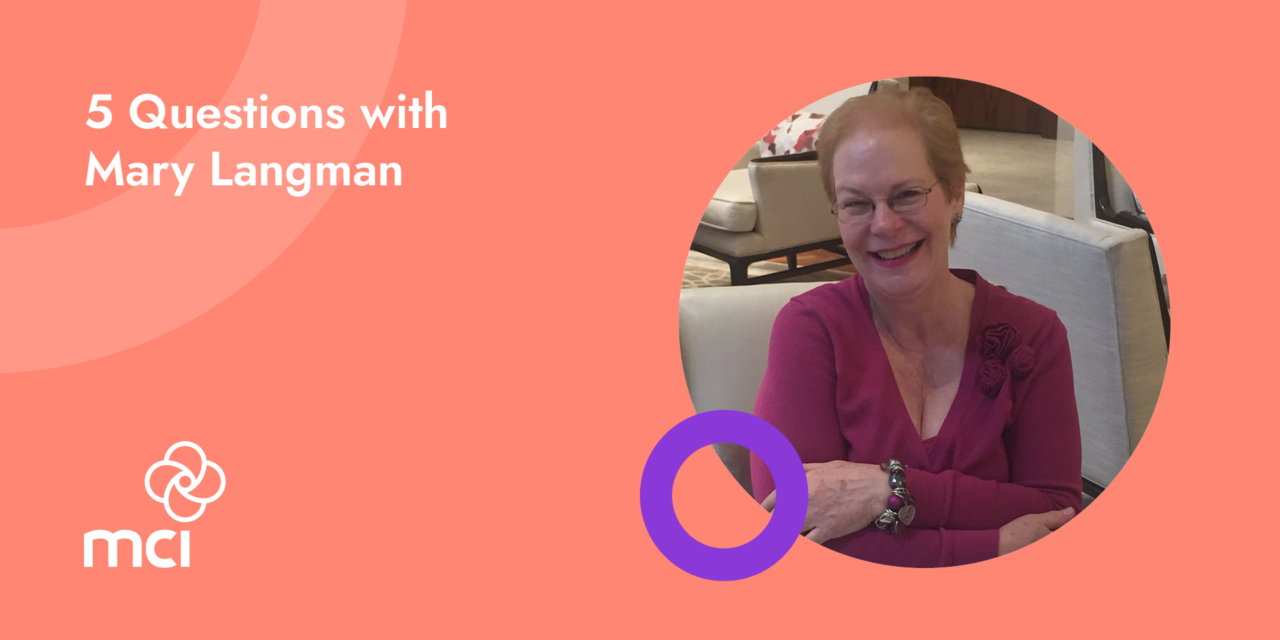5 Questions with Mary Langman, Director, Information Issues and Policy, Medical Library Association
- After 34 years with MLA, how has your career evolved?
My current title is Director of Information Issues and Policy. Currently, my primary areas of involvement are public policy supporting funding for the National Library of Medicine (NLM) and the National Institutes of Health (NIH), access to health information, and copyright law. We do this through annual Capitol Hill meetings, responding to RFIs, and maintaining strong ties with allied organizations sharing related interests.
Because I’ve been with MLA so long, I’m thought of as the unofficial MLA historian, providing members and staff with information they need for lectures, publications, and articles. A cherished task has been drafting content by collecting information and photos for the In Memoriam we feature at the MLA annual conference. I also manage the association’s record retention process and help members understand the storage and archiving of association records as well as ensure they have access to materials they might need. As liaison to the Bylaws Committee, I have shepherded the committee through eight major bylaws revisions over the years. I also have managed the collection and compilation of printed information for MLA’s print member directory, the annual reports, and agendas for Board of Directors meetings. In the 1980s and early 1990s, board books could be upwards of 1,000 pages!
When I joined MLA in 1989, I served as assistant to the Executive Director. In that position I mainly served as secretary to the Board of Directors and provided administrative support to the Bylaws and Governmental Relations Committees. After two years, MLA hired a new Executive Director, and she elevated my position to Manager of Information Issues and Policy to support the public policy program, bylaws, and other duties. A few years later my role expanded again, and my title was changed to Director of Coordinator Issues and Policy.
Throughout the years I’ve touched almost every governance part of the organization at one point or another. I’ve served as the staff liaison to several task forces and work groups for several initiatives, which have included drafting a code of professional conduct, leading the development of social justice statements, and serving as staff liaison for our year-long centennial celebration in 1998, where I helped with fundraising, awards, and collecting artifacts for the MLA time capsule; and then more recently I collaborated to plan MLA’s 125th Anniversary activities and events.
- How have things with MLA or in the association world changed since you started?
So much has evolved since I first came to the organization. For starters, email was relatively new to MLA. The office had one computer and printer in the library. Every day, at 4 p.m., I would go into the library to read, print, and distribute email for the whole office.
In those days, we also used fax, the phone, and snail mail to send action alerts to members of Congress. I remember once, hundreds of librarians across the U.S. sent fax action alerts to their elected officials requesting they not support a particular piece of legislation. We received a phone call from Congressional staff asking us to stop because their communication systems were overwhelmed by the number of incoming fax messages, and to share that they heard our message.
Today, we conduct our election of officers and vote on bylaws amendments electronically. Twenty years ago, everything was done through the mail. Today’s process allows more timely sharing and distribution of information and saves the association thousands of dollars. Ten members comprising the Elections Committee would spend several days coming into the office to count ballots.
A more recent change since the pandemic is conducting annual Capitol Hill meetings virtually. While this was helpful as the nation recovered, it hasn’t proven to be the most effective way to hold these meetings. My hope is that in the future we will go back to those face-to-face meetings. Even though it’s a lot to coordinate, I believe that meeting with Congresspeople in person is a lot more effective.
- What will you miss most about MCI/MLA after you retire?
I am so humbled and honored to have had this great and fulfilling career. When I came to MLA, I was looking for a profession and job where I could spend my career. MLA was that place! Librarians are committed to serving others, the life-long pursuit of knowledge and learning, and pursuing new interests. Because these values align with mine, MLA has been the perfect spot for me. There always have been new things to do and new things to learn and share with others. I love how there has never been a dull moment working here.
I’ll miss my MLA members and the MLA and MCI staff. Many have been my mentors and have also become cherished friends, enabling me to learn and give back to this profession that I hold in the highest esteem – health sciences librarianship. The MLA staff have always worked closely together and many of us have been together for 10-20 years. It will seem odd not to connect on a daily basis.
I’ll also miss the MCI staff, for whom I’m grateful. You have all been kind, considerate, and caring, which could be considered rare during this time of continual change and unsettledness in our world. As MLA approaches our five-year anniversary with MCI, I reflect on how much I have enjoyed collaborating with you and getting to know many of you. Thank you for giving me these last 5 years to continue doing what I love most – serving our members.
- Do you have any big plans for retirement?
I have a few places I want to travel to – mainly Ireland and Scotland and I want to explore more of the USA. I’d also love to go to France one day and maybe take a cruise to the Antarctic.
Closer to home, I’m looking forward to volunteering more at church. We are starting a Stephen Ministry program to provide support services and companionship with the elderly, connecting with those who are shut ins and those living in nursing homes.
My master’s degree is in family life education, with a focus on gerontology. It’s like coming full circle, having the opportunity to practice some of those skills and learn more about that field! I have no doubt that the skills I’ve learned these last 34 plus years will also come in handy!
I’m also looking forward to the simple pleasures – sleeping in and staying up as late as I want, spending more time on needlepoint projects, going to the gym, and making new friends.
- What are your holiday plans this year?
A life-long singer, I’m looking forward to our Christmas Concert at church, visiting friends and family, and relaxing. I also have quite a few things to do at home to get ready for retirement, but maybe that can wait until after January 5, 2024!


Recent Comments